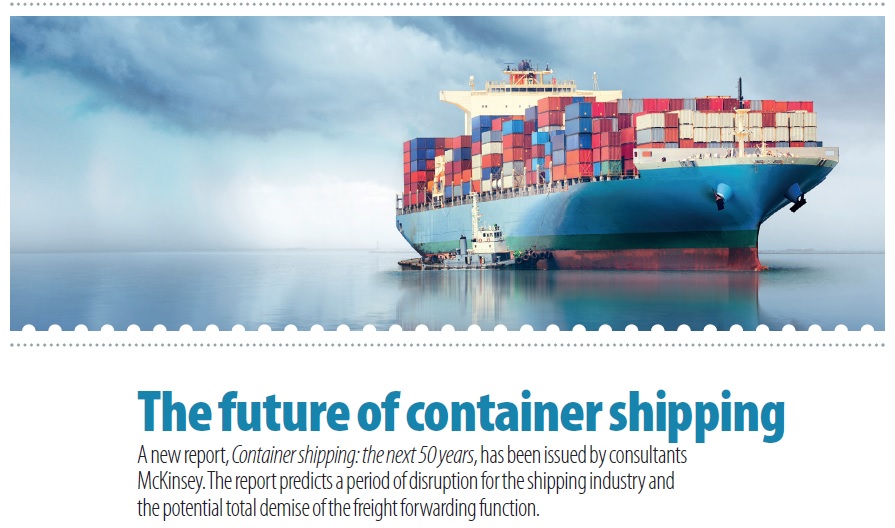A new report - Container shipping: the next 50 years - has been issued by consultants McKinsey. The report predicts a period of disruption for the shipping industry and the potential total demise of the freight forwarding function.

The disruption, the report claims, will come from digital technology, big data and the Internet of Things. It imagines a world 50 years from now where autonomous 50,000TEU vessels plough the seas accompanied by modular, drone-like floating containers, serving a volume of trade that is five times what it is today.
The report says that “short-haul intraregional traffic will increase as converging global incomes, automation, and robotics disperse manufacturing footprints. Container flows within the Far East will remain huge, and the second-most significant trade lane may link the region to Africa, with a stopover in South Asia.”
It predicts multiple consolidation cycles leaving only three or four major container lines operating. These will be digitally enabled independents with a strong customer orientation and innovative commercial practices, or small subsidiaries of tech giants blending the digital and the physical.
Most alarmingly for many, the report expects the virtual extinction of freight forwarding as digital technology removes the need for intermediaries. “All winners, closely connected through data ecosystems, will have fully digitized customer interactions and operating systems,” it says.
There will be a fully autonomous transport chain that will extend from loading, stowage, and sailing to unloading directly onto autonomous trains and trucks, with last-mile deliveries by drones. McKinsey says that some customers who are prepared to pay a premium will want container-logistics providers fully integrated into their supply chains. Others will continue to demand the cheapest sea freight. Both will expect transparency and reliability to be the norm, not the exception.
What should shipping lines do to meet this challenge?
The report says that firstly, shipping companies should invest in digital technologies to “differentiate their products, disintermediate value chains, improve customer service, raise productivity, and cut costs”. The risk is that tech giants and digital disruptors will capture most of the value from customer relationships by moving faster than incumbents.
Secondly, McKinsey says that next-generation innovations will have to be orchestrated across the entire value chain. “Carriers and terminal operators share an especially rich agenda: bigger vessels paired with infrastructure investments for terminals, transparent ship arrivals and berthing, and larger containers. Integrated logistics providers could make freight forwarders irrelevant by mastering the complexity and the customer interface.”
Finally, it says that the shipping industry should be bold. It says that the industry was built by strong leaders who dared to sail through the storms. Although it now once again faces a period of disruption - this time from digital technologies - there is a path forward for companies willing and able to seize the day.
Download the full report, Container shipping: The next 50 years (PDF–27 MB), for a more complete explanation of where the industry is going and how it could get there.
Click here to see the next Editor's pick.